Ijraset Journal For Research in Applied Science and Engineering Technology
- Home / Ijraset
- On This Page
- Abstract
- Introduction
- Conclusion
- References
- Copyright
A Study on the Challenges and Opportunities of Women Entrepreneurs
Authors: Faaz Mistry, Junaid Quadri, Ved Patel, Krupali Patel, Diya Shah, Mitali Makhija, Dhruvi Sakaria, Muskan Manglani
DOI Link: https://doi.org/10.22214/ijraset.2024.59427
Certificate: View Certificate
Abstract
This research explores the complex terrain of female entrepreneurship with the goal of illuminating the diverse obstacles and prospects encountered by female entrepreneurs. Gender inequality still prevents women from fully participating in and succeeding in the business sphere, even in spite of the increasing recognition of their contributions to the entrepreneurial ecosystem. This study clarifies the structural, cultural, and institutional obstacles that face female entrepreneurs by an extensive analysis of the body of literature and also with the help interviews of women entrepreneurs in-person and through google forms the data that was collected was then analysed. This research adds to a deeper understanding of the complex factors influencing women\'s entrepreneurial aspirations and provides insights into practical solutions for creating gender-inclusive entrepreneurship ecosystems by critically assessing both possibilities and constraints.
Introduction
I. INTRODUCTION
Today's female entrepreneurs in India's business sector encounter a variety of obstacles and opportunities that mold their own paths. Even with changes in laws and societal attitudes, women in India still face obstacles when launching their own enterprises. Obtaining sufficient funding is a major issue. Occasionally, banks and investors are hesitant to fund ventures driven by women, which results in a financial gap. In order for female entrepreneurs—who frequently possess excellent ideas and business acumen—to realize their full potential, it is imperative that this obstacle be removed. Gender bias is another difficult issue. Stereotypes and rigid notions of women's duties can impede women's advancement in the workplace. In order to get over this, we must make a concerted effort to advance a culture that values people for their ability rather than their gender. The perception of women in leadership posts is influenced by prevailing conventions and expectations. It can be difficult to strike a balance between work and family; to do so, one must be self-motivated and have support from inclusive workplace cultures and flexible work schedules. However, there are increasing opportunities in spite of these difficulties. With the help of creativity and government efforts, India's startup environment is developing into a fantastic location for female business owners. The goal of initiatives like Mudra Yojana and Stand-Up India is to promote women-owned enterprises and broaden the economic landscape. By enabling women entrepreneurs to use digital platforms for networking, marketing, and business, technology helps level the playing field. Traditional barriers are broken down by e-commerce, social media, and digital marketing, which help reach a wider audience. Additionally, corporations and investors recognize the importance of women-led firms as awareness of diversity and inclusion rises. Initiatives that support gender diversity demonstrate a shift in perspective, fostering an atmosphere in which aptitude and creativity are valued above gender.
In conclusion, the world of Indian women entrepreneurs presents both exciting potential arising from a changing economy and limitations posed by old conventions. It is imperative to acknowledge and address obstacles while capitalizing on new opportunities in order to foster a more vibrant and inclusive entrepreneurship environment in India.
II. OBJECTIVES
In order to create focused interventions and policies, analyze the particular difficulties experienced by female entrepreneurs in diverse industries and geographical areas, such as discrimination, work-life balance concerns, cultural hurdles, and gender bias.
Examine how innovation, technology, and digital platforms can empower women company owners. See how digitalization can open up new doors, close gaps in market access, and improve the scalability and resilience of businesses.
Evaluate the success of current efforts and support programs targeted at encouraging women to start their own businesses, noting areas for improvement and best practices to maximize their influence on the growth of female-led enterprises and economic empowerment.
III. RESEARCH METHODOLOGY
- Research Design: The research design that we used in this project is exploratory and casual
- Source of Data: The source used is primary data while collecting data and secondary while doing LRs
- Data Collection: The data is collected with the help of a Questionnaire.
- Population: Women Entrepreneurs living in Ahmedabad
- Sample: Single women entrepreneur
- Sampling Frame: Ahmedabad
- Age Group: 18-30 and Above 30 years.
- Sample Size: 100
- Sampling Method: Non Probability Convience Sampling method
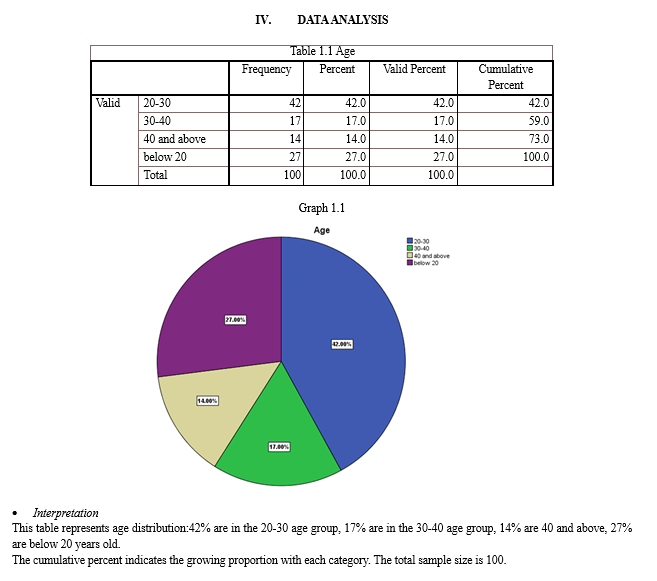
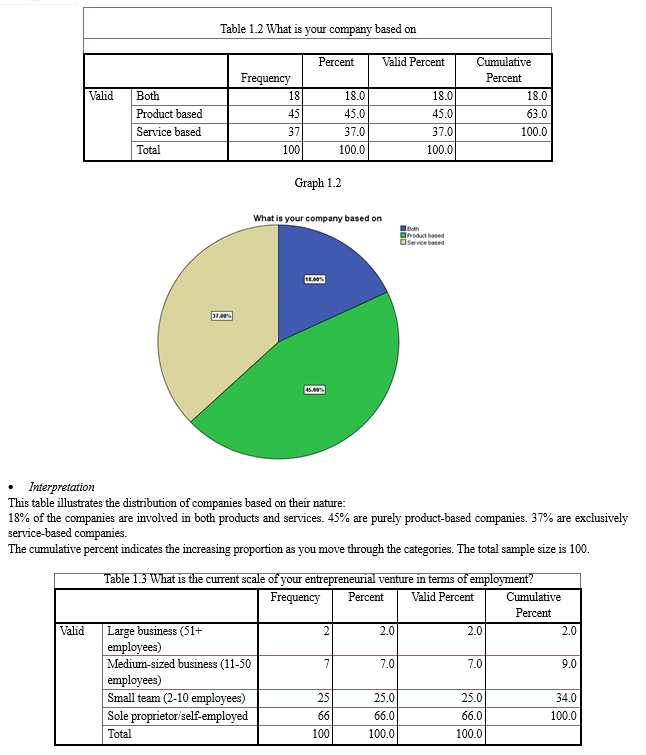


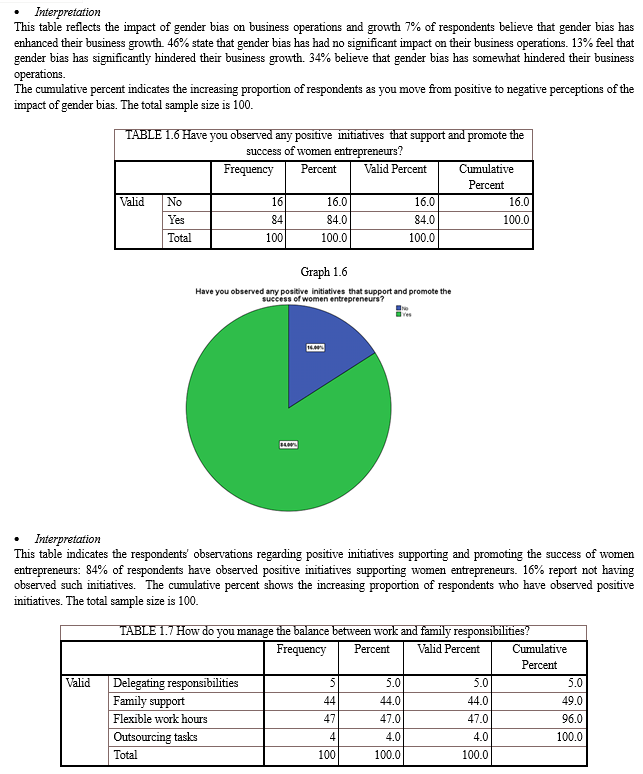


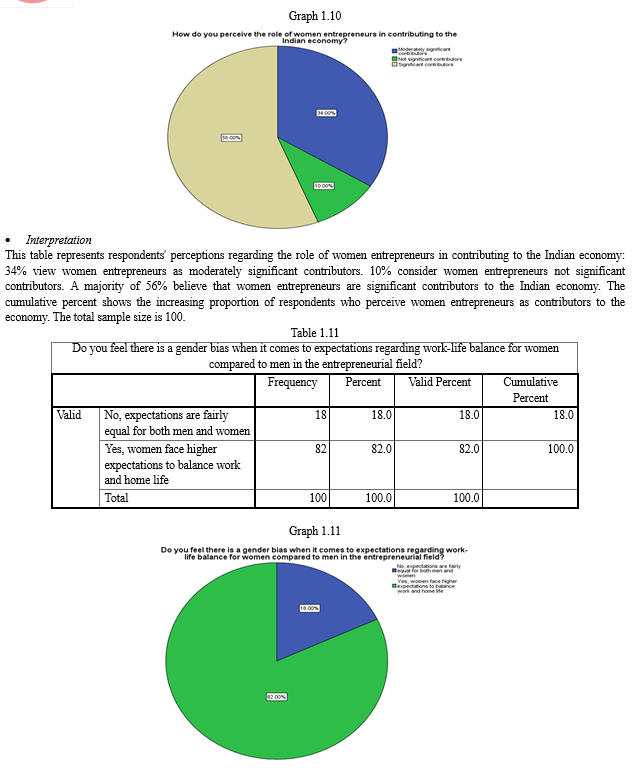
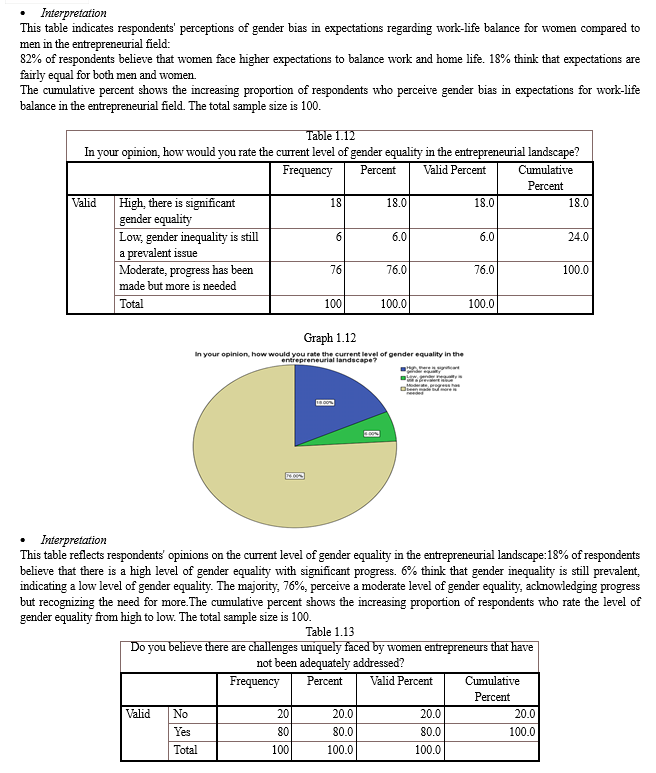
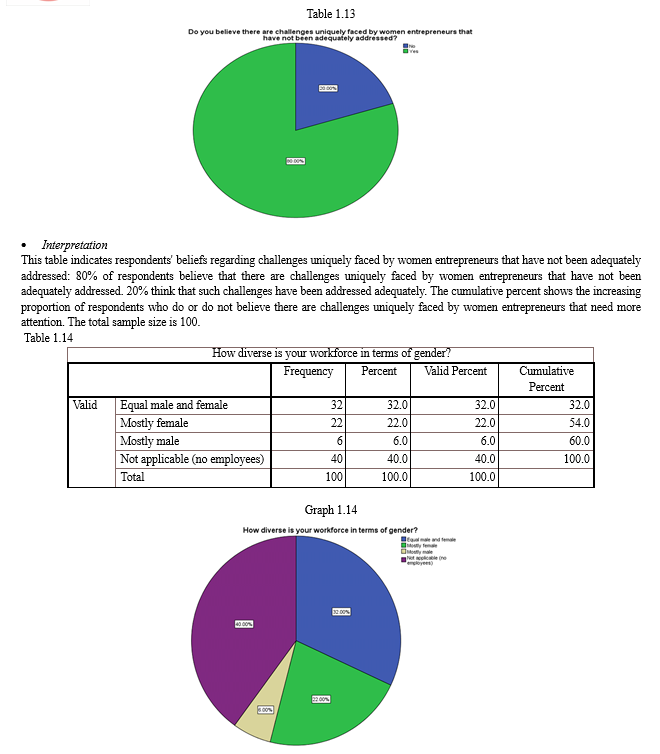


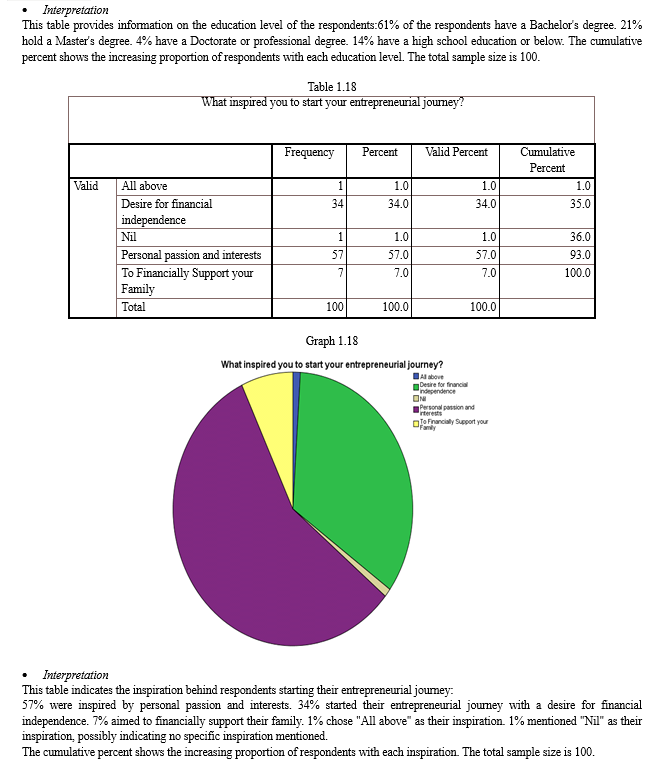

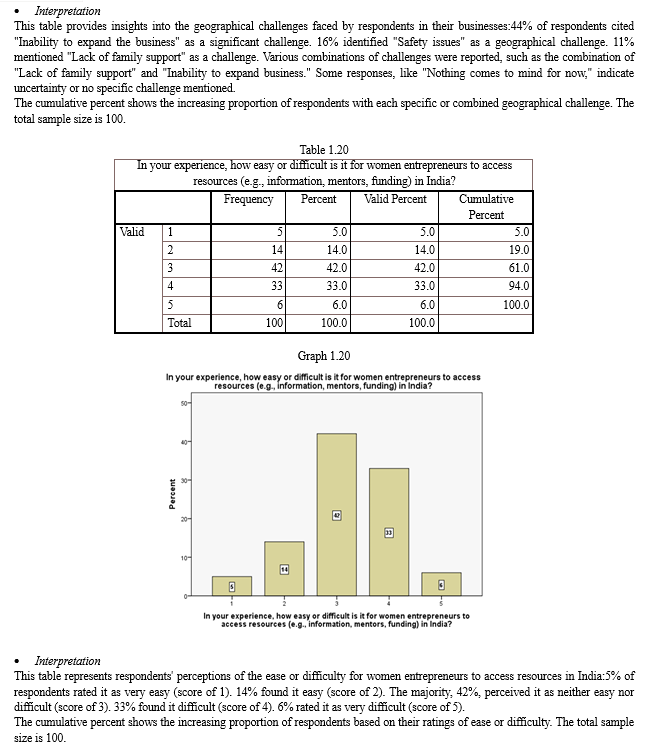
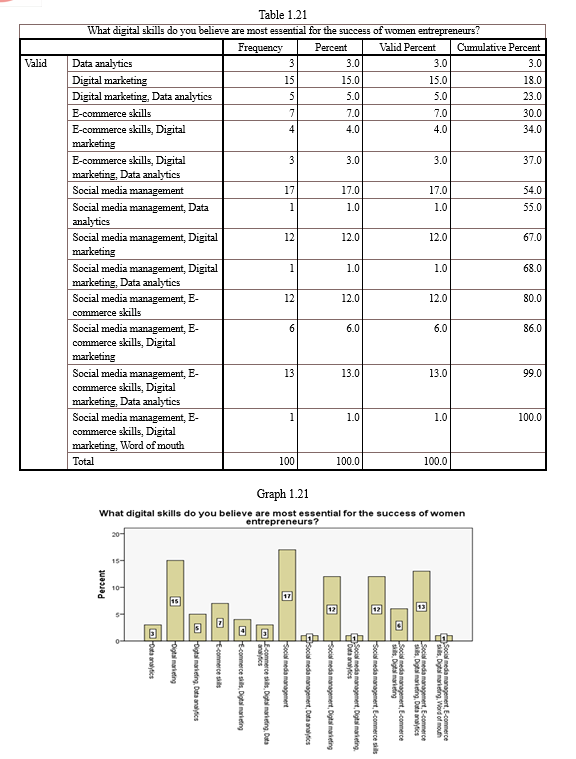
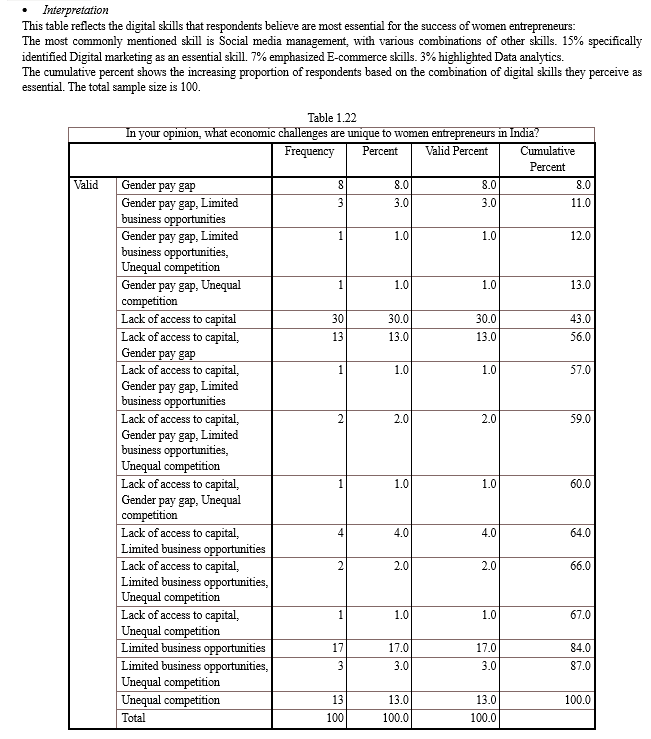

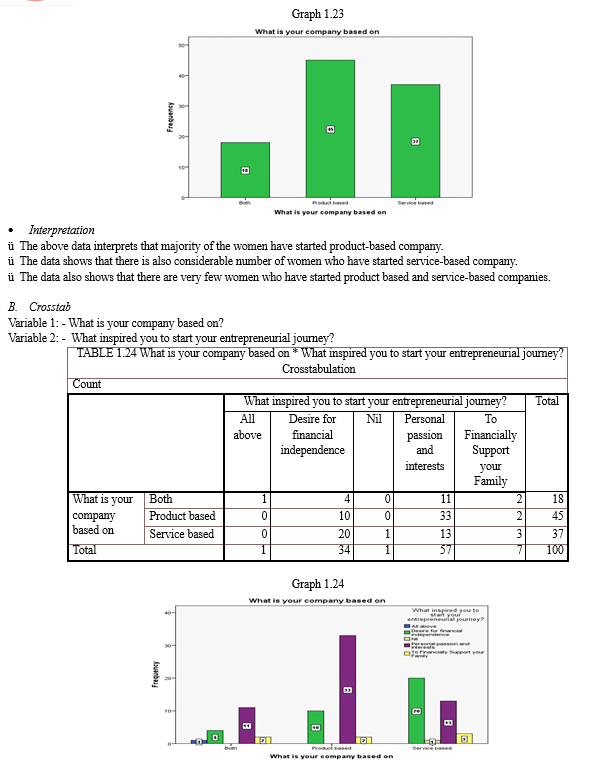

VI. FINDINGS
A. Challenges Faced by Women Entrepreneurs
- Discrimination & Gender Bias: Female entrepreneurs face prejudices when trying to obtain chances, resources, and finance. Gender stereotypes affect how competent people are seen, which may impede growth and collaboration.
- Work-Life Balance Concerns: For female entrepreneurs, striking a balance between work and personal obligations is a major difficulty. Women may be disproportionately impacted by societal standards and expectations when it comes to becoming entrepreneurs.
- Cultural Barriers: Diverse cultures bring with them differing degrees of support and acceptance for female entrepreneurs. Cultural standards that are considered conservative may serve as obstacles that impact how women are viewed in the economic world.
- Funding Accessibility: Women-owned enterprises encounter difficulties in obtaining capital, as they have restricted access to angel and venture capital investments. Reducing the financial gap is essential to competitiveness and sustained growth.
B. Empowerment via Technological Innovation
- Digital Platforms and Market Access: Digitalization lowers geographical barriers to market access by creating new channels. Online channels give female business owners the chance to connect with a worldwide audience and grow their clientele.
- Scalability and Resilience: Technology boosts scalability, enabling companies to expand without facing major resource limitations. Digital tools help firms become more resilient by enabling them to adjust to shifting market conditions.
- Closing Knowledge and Skill Gaps: Innovation and technology efforts can close knowledge and skill gaps, giving women the resources they need to succeed. Programs for digital literacy are essential to ensuring that female entrepreneurs can take full advantage of the advances in technology.
C. Support Program Evaluation
- Success Measures: Key performance indicators, including the number of women entrepreneurs assisted, business growth rates, and economic impact, are examined in order to evaluate the effectiveness of existing initiatives. Success should also be evaluated in terms of broader networks, money, and mentorship opportunities.
- Areas for Improvement: Identify areas where the current assistance programs fall short, such as poor funding, little outreach, or inadequate mentorship opportunities. Programs can be more effective if they are designed to address intersectional issues.
- Best Practices: Highlight effective tactics used by current programs, like targeted funding schemes, networking events, and mentorship activities. Examples of best practices for upcoming projects can be found in case studies of successful female-led businesses.
VII. LIMITATIONS
- Time Consuming: The process to do our research has taken a lot of time and it is a long process which is continuous in nature so research can be time consuming.
- Lack of Respondents: The major other problem is lack of respondents. It is hard to get the women’s respondents for the survey and it is the long process to convince women’s respondents.
- Sample Bias: The sample used in a research study may not fully represent the diversity of women entrepreneurs in India, potentially leading to skewed findings.
- Limited data Availability: Access to comprehensive and accurate data on women entrepreneurs in India may be limited, making it challenging to draw robust
VIII. SUGGESTIONS/RECOMMENDATIONS
The following recommendations can be made in light of the findings in order to empower and assist female entrepreneurs in overcoming the obstacles they encounter:
- Handling Gender Bias and Discrimination: Put policies in place to address gender inequalities in funding and resource allocation, such as investing opportunities that are inclusive of all genders or imposing diversity quotas. delivering education and awareness campaigns to dispel myths and advance a more diverse entrepreneurial environment.
- Fostering a Balanced Work-Life: Provide support systems and flexible work schedules to assist female entrepreneurs in juggling their personal and professional obligations. Speak up in favor of laws that support gender parity in the workplace and deal with cultural norms that could interfere with work-life harmony.
- Support and Cultural Sensitivity: Create programs that address the unique cultural requirements and difficulties faced by female entrepreneurs
???????IX. ACKNOWLEDGMENT
Getting this opportunity, we are glad to express our sincere and profound sentimental of gratitude to all those who rendered their valuable help for the successful completion of this project report entitled “A study on the challenges and opportunities of women entrepreneurs”. We are also thankful to all for sharing their veracious and illuminating views on the issues related to the project. We would also like to thank Dr. Smruti Vakil, under the guidance of whom we are able to grab this opportunity and get the chance to showcase this report in engrossing and fascinating manner. we would also like to thank parva vora and aastha kothari for their wonder contribution and support in this project. Our authentic sense of gratitude goes to GLS University that gave us a chance to illuminate us academic talents and qualifications.
Conclusion
In conclusion, the challenges faced by women entrepreneurs in India are multifaceted and require comprehensive solutions to foster their success and empowerment. From cultural biases and societal expectations to limited access to resources and funding, these obstacles hinder the growth and potential of women-led businesses. However, through targeted policies, educational initiatives, and support networks, there is immense potential to create an environment where women entrepreneurs can thrive, driving economic growth, innovation, and social progress. Empowering women entrepreneurs is not just about gender equality; it\'s about unlocking the untapped potential that benefits society as a whole. By addressing these challenges head-on, India can harness the full entrepreneurial talent and contribute to a more inclusive and prosperous future.women entrepreneurs in India encounter a myriad of challenges ranging from cultural biases and societal expectations to limited access to finance, networks, and mentorship. Additionally, they often grapple with balancing familial responsibilities with business pursuits. However, despite these obstacles, the resilience and determination of women entrepreneurs persist, showcasing their potential to drive economic growth and social change. Efforts to address these challenges through policy reforms, targeted support programs, and cultural shifts can unlock the full potential of womenentrepreneurs, fostering inclusive and sustainable development in India
References
[2] citeseerx.ist.psu.edu/document?repid=rep1&type=pdf&doi=08aa0a9d9f04f39dd5ab580f29c1a666593898c7 [3] iosrjournals.org/iosr-jbm/papers/Vol15-issue3/C01530914.pdf [4] hgsitebuilder.com/files/writeable/uploads/hostgator427959/file/ijars1 [5] Reena Agrawal Jaipuria Institute of Management, Lucknow, India Constraints and Challenges Faced by Women Entrepreneurs in Emerging Market Economy and the Way Forward [6] Swati Shastri and Shruti Shastr Department of Economics, Banasthali Vidyapith, Jaipur, India, and Abhishek Pareek Atal Incubation Centre, Banasthali Vidyapith, Jaipur, India 17 January 2019 Motivations and challenges of women entrepreneurs Experiences of small businesses in Jaipur city of Rajasthan [7] Dr. R.Sivanesan July - Sept 2014 A Comparative Study on Rural and Urban Women Entrepreneurs – Prospects and Challenges [8] Sukhjeet Kaur Matharu1 and Divya Juneja2 Factors Impacting Resilience of Women Entrepreneurs inIndia in the Face of COVID-19 [9] Khugshal, R. Women Entrepreneurs in India-Emerging Issues And Challenges. [10] Tyagi, M. A., Bhateja, R., & Tyagi, M. M. Women Entrepreneurs-Challenges and Opportunities in India. [11] Agrawal, A., Gandhi, P., & Khare, P. (2021). Women empowerment through entrepreneurship: case study of a social entrepreneurial intervention in rural India. International Journal of Organizational Analysis, 31(4), 1122-1142. [12] Dangi, N. (2014). Women entrepreneurship and growth and performance of MSMEs in India. International Journal, 2(4), 174-182. [13] researchgate.net/profile/Anjula-Rajvanshi/publication/316481936_Women_Entrepreneurs_In_India_Challenges_And_Opportunities/links/5c0e1d65a6fdcc494fe88eae/Women-Entrepreneurs In-India-Challenges-And-Opportunities.pdf Dr. Anjula Rajvanshi Associate Professor, Department of Sociology, RG PG College, Meerut [14] papers.ssrn.com/sol3/papers.cfm?abstract_id=3110340Dr.KalpanaKoneru,Associate Prof. &Head, Department of Management Studies, Vignan’s University, Vadlamudi, Guntur Dt., AP. [15] academia.edu/download/80967343/H1901065560.pdfSonu Garg1, Dr. Parul Agarwal2 [16] academia.edu/download/58813182/1-13-172.pdfRakesh Kumar Gautam, Dr. K. Mishra [17] iosrjournals.org/iosr-jbm/papers/Vol17-issue8/Version-3/I017836973.pdf [18] ijeast.com/papers/120-129,%20Tesma611,IJEAST.pdf [19] trp.org.in/wp-content/uploads/2019/06/AJMS-Vol.8-No.2-April-June-2019-pp.-129-133.pdf [20] ijrar.org/papers/IJRAR19D1059.pdf [21] ncbi.nlm.nih.gov/pmc/articles/PMC8733164/ [22] researchgate.net/publication/253659404_Women_Entrepreneurs_Moving_Front_and_Center_An_Overview_of_Research_and_Theory [23] researchgate.net/publication/373581101_Evolution_and_Significance_of_Women_Entrepreneurs_in_India [24] journals.sagepub.com/doi/full/10.1177/02560909211015457 [25] amity.edu/UserFiles/admaa/db0c0Paper%204.pdf [26] worldwidejournals.com/global-journal-for-research-analysis-GJRA/recent_issues_pdf/2015/October/October_2015_1444890206__75.pdf [27] researchgate.net/publication/348621083_Women_Entrepreneurship_Opportunities_and_Challenges_A_Literature_Review [28] eduzonejournal.com/index.php/eiprmj/article/download/318/275 [29] Sarfaraz, L., Faghih, N., & Majd, A. A. (2014). The relationship between women entrepreneurship and gender equality. Journal of Global Entrepreneurship Research , 4 (1), 6. [30] Pathak, S., Sonia, G. and Buche, M.W. (2013), “Influences of gendered institutions on women’s entry into entrepreneurship”, International Journal of Entrepreneurial Behaviour & Research, Vol. 19 No. 5,pp. 478-502. [31] Bajpai A.D.N, Mishra S.K.(2007). Women Empowerment And Reproductive Behaviour. New Delhi: Classical Publishing Company. Page No. 138. [32] Ashlin Mathew, “Making It in India,” IMF Finance & Development, Vol. 56(1), p. 14-17, 2019, [33] org/external/pubs/ft/fandd/2019/03/pdf/womens-entrepreneurship-in-India- mathew.pdf. [34] journaleet.in/download-article.php?Article_Unique_Id=JPR1695&Full_Text_Pdf_Download=True [35] researchgate.net/profile/John-Kaviarasu/publication/327097837_Women_Entrepreneurship_In_Indian_Context_A_Critical_Study_Of_Its_Challenges_And_Solutions/links/5b77ad04299bf1d5a711cbd2/Women-Entrepreneurship-In-Indian-Context-A-Critical-Study-Of-Its-Challenges-And-Solutions.pdf [36] search.proquest.com/openview/ab35921747269d5014eef853f13fb873/1?pq-origsite=gscholar&cbl=506334 [37] researchgate.net/profile/Jyoti-Agarwal-4/publication/330839682_Women_Entrepreneurship_and_Innovations_Evidence_From_India/links/5c56cdd6299bf12be3f81058/Women-Entrepreneurship-and-Innovations-Evidence-From-India.pdf
Copyright
Copyright © 2024 Faaz Mistry, Junaid Quadri, Ved Patel, Krupali Patel, Diya Shah, Mitali Makhija, Dhruvi Sakaria, Muskan Manglani. This is an open access article distributed under the Creative Commons Attribution License, which permits unrestricted use, distribution, and reproduction in any medium, provided the original work is properly cited.

Download Paper
Paper Id : IJRASET59427
Publish Date : 2024-03-26
ISSN : 2321-9653
Publisher Name : IJRASET
DOI Link : Click Here
 Submit Paper Online
Submit Paper Online

